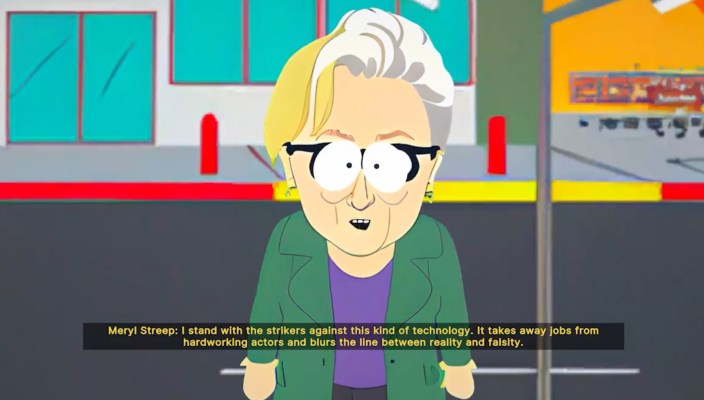The ongoing strike of creatives in TV and film, plus the nascent threat of AI-based writing and effects, make it a complicated time to work in show business. But little savvy is required to see that this may be the worst possible moment to soft-launch an AI that can “write, animate, direct, voice, edit” a whole TV show — and demonstrate it with a whole fake “South Park” episode.
The company behind it, Fable Studios, announced via tweet that it had made public a paper on “Generative TV & Showrunner Agents.” They embedded a full, fake “South Park” episode where Cartman tries to apply deepfake technology to the media industry.
The technology, it should be said, is fairly impressive: Although I wouldn’t say the episode is funny, it does have a beginning, a middle and an end, and distinct characters (including lots of fake celebrity cameos, including fake Meryl Streep). On a GitHub page, the processes that interact to perform this complex task are detailed, with the appropriate examples and diagrams.
But ultimately the whole thing seems monstrous. Cue Jeff Goldblum talking about how just because they could doesn’t mean they should. Especially when half of Hollywood is striking and many of the rest are doing their best not to cross picket lines.
Actual writers, directors, editors, effects workers, and millions of others are warning of the dangers of AI — not that it will destroy life on earth, but that it will be employed as a cost-cutting measure by clueless executives, eliminating livelihoods and reducing creative work to a self-perpetuating algorithmic mess. Is this not Midjourney for TV, with all that implies?
CEO Edward Saatchi told TechCrunch that he thinks demonstrating this capability is actually good for the labor side of the strike.
We think the timing is correct — we are right in the middle of the biggest strike in 60 years, by releasing the research (but not the ability for anyone to create episodes of protected IP) we hope [for] the Guilds in Hollywood to negotiate strong, strong, strong protections that producers cannot use AI tools without the express permission of artists. Frankly the IP holders also need to figure out how to negotiate with AI chatbot companies who are profiting from their work.
The strike is the moment of maximum leverage to set rules for the coming decades and keep producers from using this tech.
Fable started in 2018 as a spinoff from Facebook’s Oculus (how times have changed since then), working on VR films — a medium that never really took off. Now it has seemingly pivoted to AI, with the stated goal of “getting to AGI — with simulated characters living real daily lives in simulations, and creators training and growing those AIs over time,” Saatchi said.
Simulation is the name of the product they intend to release later this year, which uses an agent-based approach to creating and documenting events for media, inspired by Stanford’s wholesome AI town.
If you’re confused looking at Simulation’s site, that’s understandable and partly by design. It’s not a real company, and the founding team is all fake, too — not just AI-generated portraits but non-real people. The company history is also invented. If Saatchi hadn’t told me it was all part of the product concept, I would have guessed this was an elaborate hoax (with an NFT play right around the corner).
His approach to media is certainly provocative, if that’s the word, but he is also genuinely a part of the creative community, with a Peabody for the company’s work on Lucy and the Wolves in the Walls. Which is part of what makes this whole situation so perplexing. If you asked around the many people participating in or abiding by the strike (this includes me, incidentally, outside my work as a reporter) what they thought would help their cause, I’m confident that somewhere between zero and none would say “a generative AI that produces entire TV episodes.” Yet that is exactly what Fable decided to pursue and publicize.
“If creative people can get their ideas out and cinema can have an element more like novels or painting where a single person can make a show or movie themselves we could get weirder things than the cookie-cutter studio reboots we often see,” he explained. There’s a certain sense to that, but is the only way forward across the picket line?
Perhaps, because it’s also clear that Saatchi and his team see media production as simply a stepping stone toward a higher goal. “Our focus is not on changing Hollywood — our focus is on getting to AGI,” he wrote.
Whether one, both, or neither is accomplished, Fable certainly has contributed to rocking an already unstable boat. If they don’t get sued into oblivion (the agent was certainly trained extensively on copyrighted data, to say nothing of the fake “South Park” episode), their work may yet be referenced as a notable example of the power and danger of AI.
